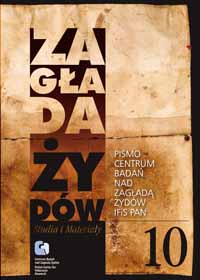Historia krytyczna i jej „gabinet cieni”. Historiografia polska wobec Zagłady 2003–2013
Critical History and its “Shadow Cabinet.” Polish historiography on the Holocaust during 2003–2013
Author(s): Bartłomiej KrupaSubject(s): History
Published by: Stowarzyszenie Centrum Badań nad Zagładą Żydów & IFiS PAN
Keywords: Holocaust; Polish historiography; criticism; methodology of history; literature and history
Summary/Abstract: The author discusses the most important phenomena in Polish historiography and the selected publications about the Holocaust released during 2003–2013. Similarly to narrativists, Krupa is interested in the shape, the language, the storytelling manner, and the metaphors used. Having indicated the most important scholarly centres and publications of sources, the author concentrates on the camp monographs, syntheses and regional studies produced during that period and then concludes that most of them are written in a very traditional way. The year 2000, when [the Polish edition] of Jan Tomasz Gross’ book Neighbors was released, turned out a breakthrough year for [Polish] historiography. Before analyzing the far-reaching consequences of this publication Krupa briefly discusses the polemics surrounding the other books by that author. On the one hand, they led to the birth of the historiographical “shadow cabinet” – a mobilisation of the milieu concentrated mostly around the IPN and aimed at disparaging the significance of Gross’ publications. On the other hand, the most important consequence of Gross’ critical thinking about the Polish stances was the birth of the “peasant trend” in [Polish] historiography. The books by Andrzej Żbikowski, Barbara Engelking, Jan Grabowski, as well as the collective works such as Prowincja noc and Zarys krajobrazu described, in a committed and interdisciplinary way, the shameful stances of the rural community – the denunciations, rapes, and even murders of Jews, with Tadeusz Markiel’s shocking testimony holding a special place among these publications. The works that heroise the Polish stances and stress the Polish engagement in the rescuing of Jews (particularly those published within the framework of the IPN project „INDEX – In memory of Poles murdered or prosecuted by the Nazis because of their assistance to Jews”) are to constitute a counteroffer to the critical “peasant trend” within the framework of the “shadow cabinet.” At the end of the article Krupa discusses the books that regard the unknown pages of the Holocaust history in Warsaw written by Agnieszka Haska, Barbara Engelking, Dariusz Libionka, or Libionka’s collaboration with Laurence Weinbaum, which are not revolutionary in the sphere of language but nonetheless broaden our knowledge on the Holocaust. The author ends his discussion with a reference to the monumental work Jewish Presence in Absence. The Aftermath of the Holocaust in Poland, 1944–2010, without which, just like without reflecting on the consequences of the Holocaust in general, it is impossible to understand Poles and the situation in Poland.
Journal: Zagłada Żydów. Studia i Materiały
- Issue Year: 2014
- Issue No: 10
- Page Range: 721-767
- Page Count: 47
- Language: Polish

